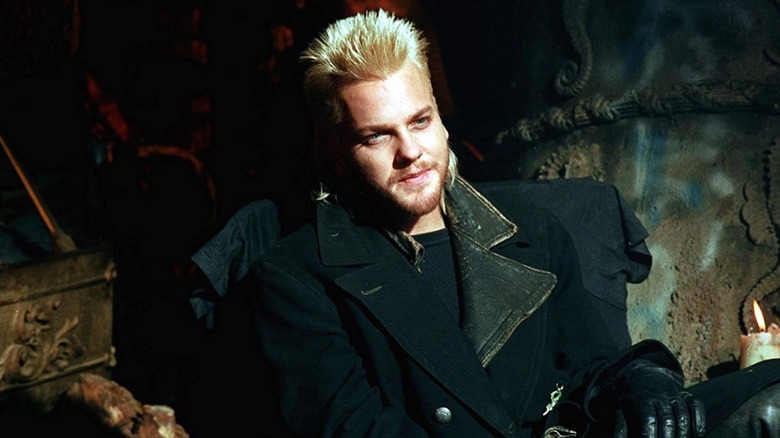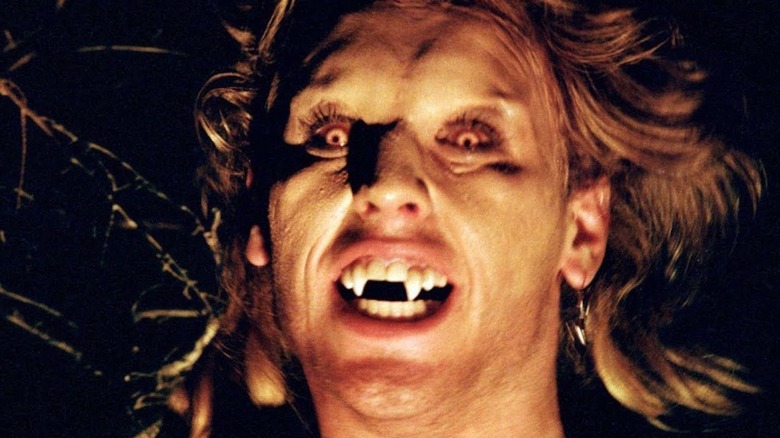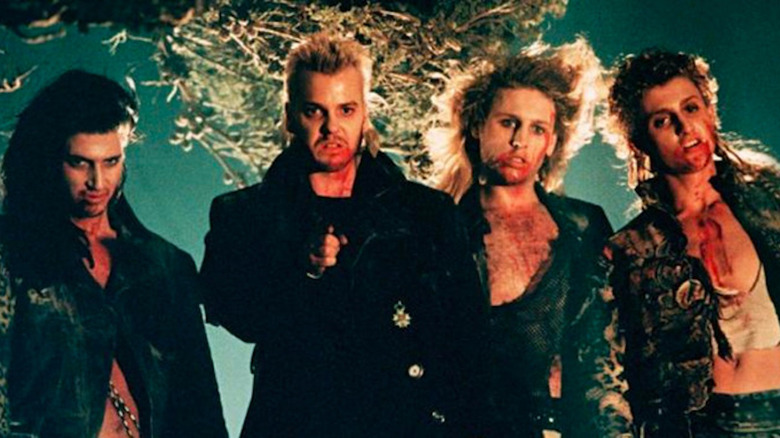Joel Schumacher Thought He Probably Should've Been Fired From Directing The Lost Boys
Joel Schumacher was an immensely talented filmmaker whose slick visual style earned him loads of high-profile assignments during the 1980s and '90s. He could deliver the sensuous perfume commercial aesthetic of A-listers like Alan Parker, Ridley Scott, and Adrian Lyne sans the auteurist demand for total creative control. He possessed the crowd-pleasing instincts of Tony Scott. He worked with the biggest movie stars of the day: Julia Roberts, Michael Douglas, Jim Carrey, Matthew McConaughey, and Mr. T. He discovered Colin Farrell with 2000's "Tigerland." He both saved and killed the "Batman" franchise.
That Schumacher had any kind of career is something of a miracle. He survived a wild youth that included a near-fatal meth addiction, and by his own admission, thousands of sexual partners as the 1980s AIDS epidemic took hold. This experience gave him valuable insight as he landed major studio assignments packed with volatile young talent. On "St. Elmo's Fire," he dealt with the Brat Pack at the height of their popularity (and carousing); two years later, he found himself wrangling the hot teen duo of Corey Haim and Corey Feldman on the set of "The Lost Boys." Schumacher was under pressure to deliver a hit summer movie for Warner Bros., which led to conflict, and on one occasion, violence. The latter incident haunted Schumacher for the rest of his life.
The moment that could've ended Schumacher's career
In a 2020 retrospective article for Empire (published two months before the director's death), Schumacher joked, "There were some troubled youths on the film, [...] so maybe a troubled director was perfect!"
Jason Patric, the son of actor-playwright Jason Miller (best known to pop culture as Father Damien Karras in "The Exorcist"), was primed for stardom at the time and knew it. Though he'd only completed one film at this point in his career (the box-office mega-bomb "Solarbabies"), he took his role in "The Lost Boys" with the condition that he would not have to don vampire prosthetics. But the fluid nature of the screenplay during the shoot wound up requiring Patric to go full vamp. The furious not-yet-star threatened to walk off the movie, but the studio smoothed things over. Still, Schumacher felt awful. "I don't lie to actors," he said.
Schumacher felt worse about an incident involving Brooke McCarter, who played a member of Kiefer Sutherland's vampire clique. In the scene where he attacks the Frog brothers (Feldman and Jamison Newlander) in the Emerson's bathroom, McCarter, who, per Schumacher, had gotten "deep in character" as a psycho surfer dude, couldn't nail his entrance with the frightening intensity the moment required. Schumacher was up against time limitations with his child actors and lost his cool. As he told Empire:
"I was so frustrated, and I just slapped him and pushed the door in front of him. I'd never done it in my life, and never again. I'm ashamed of it. It's outrageous — he should have reported me, I should have been up on charges. But I've apologized many, many times."
Be good to your actors, even when they're not being good to you
Schumacher is obviously right. There's no excuse for abusing an actor mentally or physically. We've heard the stories of Alfred Hitchcock playing cruel mind games with his stars, and David O. Russell incurring the wrath of George Clooney by roughing up a performer on the set of "Three Kings."
Actors are precious cargo. Yes, they can be difficult, sometimes horribly so, but abusive behavior is never a solution, and it's on the director to be the adult in the room and defuse volatile situations. Everyone's on a schedule, and days must be made (and Schumacher was not yet a bankable filmmaker at the time), but this is the job. It's not for the faint of heart.
Schumacher finished "The Lost Boys," and scored a mild box office success with a $32 million domestic gross on a $9 million budget. He became a go-to director for Warner Bros. by knocking out big, buzzy hits like "Falling Down," "The Client," "Batman Forever," and "A Time to Kill." After the disaster of "Batman & Robin," he got off the blockbuster train and mostly focused on smaller movies, some of which showcased his talent for directing stars. 2002's "Phone Booth," led by a brilliantly jittery Colin Farrell, is a crackerjack thriller that fully exploits the pulpy genius of Larry Cohen's script.
Regardless of the film's quality, actors seemed to trust Schumacher. It's a shame he had to nearly blow his career to get here.


